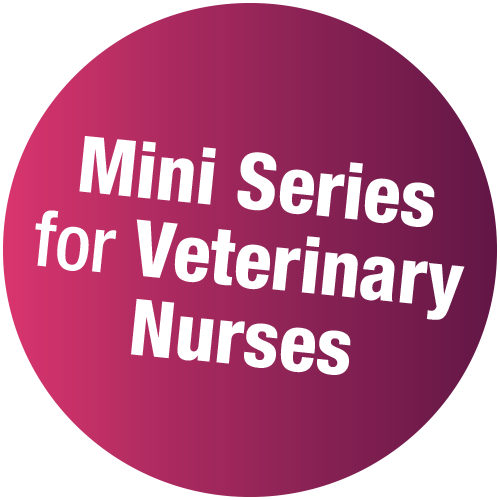MS215 – Infection Prevention & Control for Veterinary Nurses – Nurses
£297.00 (+VAT)
12 months access to recordings and course materials is included. Please note that these are webinar recordings and not live events. Full details on how to access the Mini Series will be emailed to you.
- Join Tania Yelland VN Cert Ed, Lecturer in Veterinary Nursing, Bicton College for three 2-hour online sessions
- Comprehensive notes to downloaded
- Self-assessment quizzes to ‘release’ your 8 hours CPD certification (don’t worry, you can take them more than once if you don’t quite hit the mark first time)
- A whole year’s access to recorded sessions for reviewing key points
- Superb value for money – learn without travelling
- Watch the recordings on your iPad!
- This Mini Series was originally broadcast in May 2020
Programme
Session 1
Basic Principles of IP and C and Hospital Biosecurity
Throughout Session 1, we will explore infection prevention and control in daily practice and what can be done to maintain a safe and healthy working environment for both patient and staff. We will discuss biosecurity and its importance and how to recognize breaches in biosecurity and how to deal with them appropriately. As nurses, we are heavily involved in maintaining a clean and infection free environment, using disinfectants, PPE, following protocols, SOPs, and handling tricky situations. This module will help give to give you the confidence in the basics of infection control practice.
What you’ll learn:
- Delegates will understand the importance of biosecurity in the practice environment
- Delegates will gain confidence in vital techniques such as hand hygiene and correct use of PPE
- Delegates will build up the confidence to write important protocols and educate other team members on crucial infection control techniques/practice
Infectious Patients: Barrier Nursing, Isolation and Everything In Between
Session 2 will be centered around the infectious patients and we will take a look at the various ways we can approach their veterinary care. There’s a long list of infectious diseases for both canine and feline species, and we shall exam those that require barrier-nursing care and care within an isolation facility. It is also vital for us to consider and discuss hospital-acquired infections (HAIs) and their place in veterinary medicine, how they can affect hospitalised patients, especially those who are critically ill and in intensive care. HAIs are an ongoing problem in both veterinary and human medical practice, with some pathogens presenting as multidrug-resistant organisms, making them challenging to manage and treat.
What you’ll learn:
- Delegates will learn about the various infectious diseases, including zoonotic diseases and how to handle patients with an infectious disease
- Delegates will gain confidence in their skills of barrier nursing and isolation techniques
- Delegates will learn about HAIs and how to implement prevention, management and surveillance strategies and protocol into practice
IP and C of the Surgical Patient and Surgical Practice
Looking into Session 3, we will explore the risks of surgery and the associated infection control risks for the anaesthetised surgical patient. Surgical site infections are a serious complication that can occur in the postoperative period and we will discuss predisposing factors, along with potential common causes. With surgery, comes the surgical environment, therefore we will take a look at the management of the surgical environment and how this can impact on infection control and potential surgical site infections. An important aspect of surgery is the instrumentation, and as veterinary nurses, we generally have the responsibility of cleaning, maintaining and sterilizing the equipment and instruments. We will therefore explore the different methods of cleaning, disinfection and sterilsation.
What you’ll learn:
- Delegates will be able to identify surgical site infection risks and be able to implement protocols and interventions to help reduce the occurrence of surgical site infections
- Delegates will have the confidence to set up and run an effective and aseptic surgical/theatre environment and maintain good aseptic practice
- Delegates will have the knowledge to maintain and effectively clean and disinfect surgical instrumentation after use, and have knowledge of the various methods of sterilisation available
The price includes all 3 sessions, notes and quiz – 8 hours of CPD
*No traffic jams, accommodation hassles, pet or childcare, rota clashes, locum fees ……….. just great CPD and a valuable ongoing resource.
Course Feedback :
“The content of the Mini Series will help me very much in my work in practice. It will give me confidence to approach cases in a logical way and reach a working diagnosis and treatment plan, whilst recognising where specialist advice and referral is appropriate.”
“Excellent review of key points/areas of infection prevention and control.”
“Helps to refresh my knowledge of how to nurse certain infectious diseases. It will help us improve our practice protocols and SOPS.”



